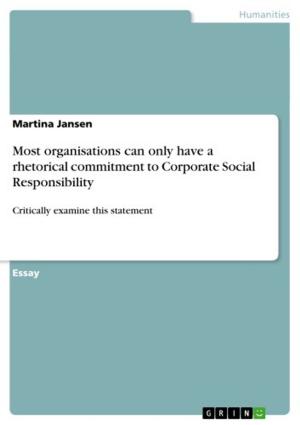Government competition policies relating liberalization
Nonfiction, Social & Cultural Studies, Political Science, Politics, Economic Policy| Author: | Christian Nicke | ISBN: | 9783638871235 |
| Publisher: | GRIN Publishing | Publication: | December 5, 2007 |
| Imprint: | GRIN Publishing | Language: | English |
| Author: | Christian Nicke |
| ISBN: | 9783638871235 |
| Publisher: | GRIN Publishing |
| Publication: | December 5, 2007 |
| Imprint: | GRIN Publishing |
| Language: | English |
Essay from the year 2006 in the subject Business economics - Economic Policy, grade: 4,0 (gut), University of Pécs (Faculty of Business and Economics), course: Business Economics, 13 entries in the bibliography, language: English, abstract: 'Almost all market competitors are firms - business organizations (social groupings) that are, for the most part, internally cooperative, not competitive. Firms are the principal suppliers and buyers of most products and services, while consumers (households) generally buy only final goods (...). Typical market transactions involve competition among firms. Many of these firms, including subtypes such as labour unions, can legally own and exchange property and differentiate and isolate their legal liability as a group from the inability of their members.' The competitive-cooperative market system is controlled by formal social regulations we call competition policy. This term refers to the body of laws of a state which govern the extent, and ability, to which bodies can economically compete. They hence to restrict practises that can pull down market competition such as monopoly or cartel. Most nations have an own legal competition framework, and there is a general agreement on what is and what is not acceptable behaviour. 'In general, liberalization refers to a relaxation of previous government restrictions, usually in areas of social or economic policy. (...) Most often, the term is used to refer to economic liberalization, especially trade liberalization or capital market liberalization, policies often referred to as neoliberalism. One of the world's most open trade ad investment regime is the one of the United States. However, a liberalized and deregulated market has to be supported by rules of the game to ensure competition. But although economic liberalization often is associated with privatization, the two can be quite separate processes. As an example, in the European Union the gas and electricity markets were liberalized a few years ago, instituting a system of competition; but some of the leading European energy companies (such as EDF or Vattenfall) remain partially or complete in public ownership. 'Liberalized and privatized public services may be dominated by just a big few big companies, particularly in sectors with high capital costs, or high sunk cost, such as water, gas and electricity. In some cases they may remain legal monopolies, at least for some part of the market' (i.e. parts of postal service in Germany a few years ago).
Essay from the year 2006 in the subject Business economics - Economic Policy, grade: 4,0 (gut), University of Pécs (Faculty of Business and Economics), course: Business Economics, 13 entries in the bibliography, language: English, abstract: 'Almost all market competitors are firms - business organizations (social groupings) that are, for the most part, internally cooperative, not competitive. Firms are the principal suppliers and buyers of most products and services, while consumers (households) generally buy only final goods (...). Typical market transactions involve competition among firms. Many of these firms, including subtypes such as labour unions, can legally own and exchange property and differentiate and isolate their legal liability as a group from the inability of their members.' The competitive-cooperative market system is controlled by formal social regulations we call competition policy. This term refers to the body of laws of a state which govern the extent, and ability, to which bodies can economically compete. They hence to restrict practises that can pull down market competition such as monopoly or cartel. Most nations have an own legal competition framework, and there is a general agreement on what is and what is not acceptable behaviour. 'In general, liberalization refers to a relaxation of previous government restrictions, usually in areas of social or economic policy. (...) Most often, the term is used to refer to economic liberalization, especially trade liberalization or capital market liberalization, policies often referred to as neoliberalism. One of the world's most open trade ad investment regime is the one of the United States. However, a liberalized and deregulated market has to be supported by rules of the game to ensure competition. But although economic liberalization often is associated with privatization, the two can be quite separate processes. As an example, in the European Union the gas and electricity markets were liberalized a few years ago, instituting a system of competition; but some of the leading European energy companies (such as EDF or Vattenfall) remain partially or complete in public ownership. 'Liberalized and privatized public services may be dominated by just a big few big companies, particularly in sectors with high capital costs, or high sunk cost, such as water, gas and electricity. In some cases they may remain legal monopolies, at least for some part of the market' (i.e. parts of postal service in Germany a few years ago).















